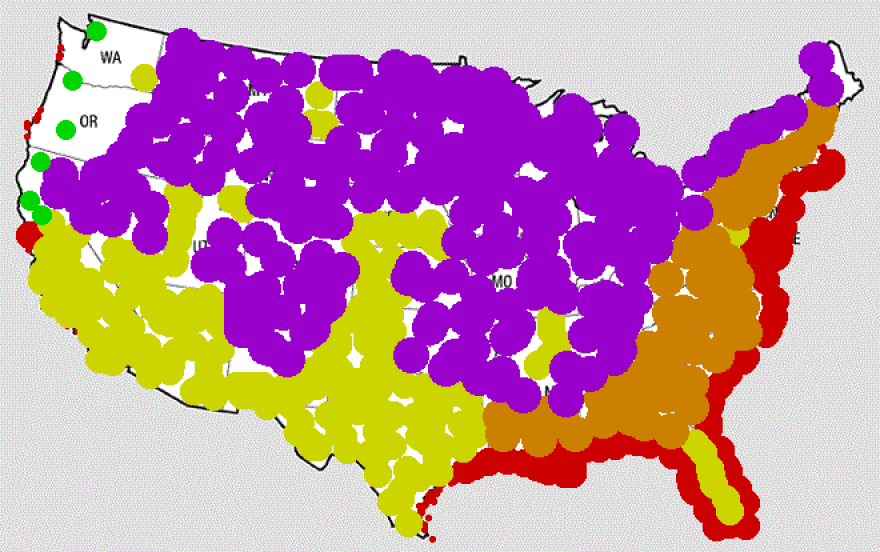The Pacific Northwest stands out as just about the only part of the country that will be largely spared from the ill effects associated with global warming, according to KPLU weather expert Cliff Mass, who mapped out all the calamities expected to result from climate change over the next century.
Mass started out with a clean map of the United States, then plotted out the expected dangers, from lethal heat waves, tropical storms and hurricanes to sea-level rise and drought. The result: Washington and Oregon are the only states that appear to escape most of those dangers.
"We may have some serious effects, especially by the end of the century,” Mass said. “But it looks like they’ll be more benign here than almost any place in the country.”
That means the Northwest will be more livable, and might become a magnet for people fleeing from worsening weather. Among the reasons for the Northwest's potential as a “climate refuge,” he lists the following:
1. The Pacific Ocean
Mass says a major reason for the anomaly is the Northwest's proximity to the Pacific Ocean. The eastern Pacific in particular is expected to warm up more slowly than almost any place else on the planet.
“And that controls our weather, so we won’t warm up quickly,” he said.
2. No Drought
Drought is not an issue for all but the southwestern corner of Washington.
“In fact, we’ll probably have more precipitation than we have right now,” Mass said.
Snow pack will diminish as atmospheric rivers bring more intense rains, so flood danger and water storage are the bigger problems, but Mass says infrastructure fixes can help alleviate that threat.
3. Sea-Level Rise A Smaller Threat
Sea-level rise is less of an issue in the Northwest because we have steep landscapes that rise up from the coast. Also, the coast is actually rising here since it doesn’t bear the weight of ice-age glaciers, and the land is still moving up.
4. No Twisters
Hurricanes and tropical storms, which will get more intense in other parts of the country, are not an issue in the Northwest.
“So, I can go through one item after the other of major changes that are going to happen under global warming. And most of them will not produce serious effects here in the Northwest,” Mass said.
Mass also cites researchers at Portland State University, who have published a study suggesting the Willamette Valley could become a place to ride out worsening conditions of a warming planet.
---
The weekly KPLU feature "Weather with Cliff Mass" airs every Friday at 9 a.m. immediately following BirdNote, and twice on Friday afternoons during All Things Considered. The feature is hosted by KPLU Environment Reporter Bellamy Pailthorp. Cliff Mass is a University of Washington Professor of Atmospheric Sciences, a renowned Seattle weather prognosticator, and a popular weather blogger. You can also subscribe to a podcast of “Weather with Cliff Mass” shows.







